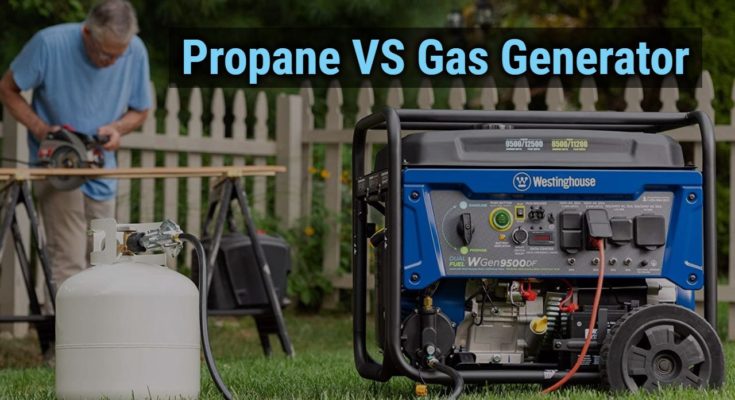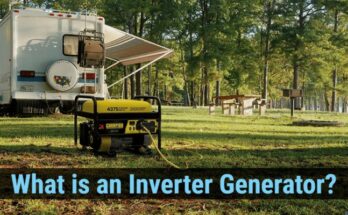A portable generator becomes the main pillar of the house on which all the appliances of your house will rely during the power outage. The portable generator is a must if you experience a frequent power outage. It can keep the lights running, it can charge your electronics and can power your computer. If you are working from home, then you won’t face any downtime.
Moreover, construction workers also use portable generators to power their tools if the onsite electricity is not available. This being said, all the portable generators will have one thing in common, and that is a need for fuel. Without fuel, they can’t run.
The most favored fuel type for the generator is the gasoline and the propane? But which is the better of the two? To get an answer, keep reading. We have discussed both the fuels and their pros and cons in detail.
Gasoline Generators
When it comes to the most used generator, then you can safely guess that it would be the gasoline generators. Their power output and low cost make them more popular and preferred than the propane-powered ones.
Also, another reason for having a generator that runs on gasoline is the easy access to the fuel. You will find the gasoline around you at any time of the normal day.
Gasoline generators are most commonly used, so, on the day of emergencies, most people will buy them from the gas station, and they may run out of it. If you are late, then you will go back empty-handed. Even if the gas is not completely sold out, then during emergencies, they might cost 2 to 3 times more.
If you are looking for a generator that can power your appliances during a disaster, then the gasoline generator isn’t the one you should consider.
Unlike propane generators, the structure and working of a gasoline generator are simple, and if it faces a fault, then it can be easily repaired at a low cost. On top of that, they won’t cost on initial purchase as much as the propane generators do.
Gasoline is a highly flammable fuel, and it doesn’t easily evaporate, which makes it highly dangerous to store in large quantities as it can result in a dangerous explosion if something goes wrong.
Besides, they have a low shelf life and are easily available at the nearby gas station, so the storage of gasoline in large quantities might not be a good idea. Gasoline can stay good for as long as 12 months; after that, it starts getting bad. If you want to use it, do it in the span of 12 months.
If you are environmentally conscious and care about the environment, and want to minimize your impact, then the gasoline generator is not for you. Gasoline is not a clean fuel at all, and it generates a high amount of carbon monoxide. It is deadly if breathed in for a longer period.
Now, gasoline isn’t available in tanks, so you will have to fill it in the generator tank from the storage tank, and if you want to run it for an extended time, then it needs to be done quite frequently, which might get frustrating.
But due to the placement of the tank on the unit itself aids to the portability of the generator. Also, the gasoline units are smaller than the propane units, so that also helps for easy maneuvering.
Propane Generators
Propane generators have become a preferred choice of many homeowners due to the advantages propane brings compared to gasoline. If we start with the storage, then the propane is available in tanks of different sizes, so if you want to bring the generator to some other locations or picnic with you, then the tanks are easy to maneuver.
Besides, the tank is completely sealed; this eliminates the risk of propane spillage, and even if that happens, then it quickly evaporates. This avoids any risk associated with the fuel spillage.
Moreover, when the power goes out, gas stations will shut down within a few hours of electricity absence, so no gasoline or diesel will be available to use. But propane will be available. It makes the propane generator more reliable.
Moving on, the propane has an excellent shelf life. It will be usable for 10 to 12 years of storage. The shelf life is without the addition of any kind of stabilizer. This means you can store the large volume of propane without worrying that it will go bad.
This gets really important if you use your generator only when the disaster hits, as you don’t know if you will need your generator anytime soon. Not many people will store the gasoline for that much period. If you have it stored and if there is a critical need, then it can be used.
Use of a propane generator will reduce your carbon footprint as it burns really clean, it emits less CO to the environment, use of propane is an eco-friendly choice. Moreover, if you prefer peace of mind while enduring some decline in performance, then the propane generator is for you.
The propane generators are really quiet, make very little noise, but they are not good as gasoline when it comes to power generation. The heat generated by propane is 30% lesser than gasoline.
Propane generators are like any other generators, but, as opposed to gasoline, these generators have a more complex system. So, if it malfunctions, then the repairing cost will be higher. Also, propane generators are more expensive than gasoline generators.
You can get either a standby or portable propane unit, and this unit will be a bit larger than the gasoline generators. The bigger size means, the less convenient they are to handle.
Conclusion
As we have discussed all the advantages and disadvantages of both fuels and you have patiently gone through them, it is now time for our verdict. So, which one is better, gasoline or propane? The better fuel choice will vary from person to person as they both are great in certain situations while not so in some other situations.
If you face a power outage that stays from hours to days and if you live in a disaster-prone area, then a propane generator will be better for you. Whereas, if you want a slightly improved portability and a bit more power output, then a gasoline generator is for you.
This dilemma to choose between one fuel can come to an end if you go with the dual fuel generators. They work on gasoline and also on propane.




